Diplomatic Bluebook 2025
Chapter 2
Japan's Foreign Policy by Region
2 Regional Situations in Europe
(1) The European Union (EU)
The EU is a political and economic union consisting of 27 member states with a total population of about 448 million. It is a strategic partner of Japan that works together to uphold and strengthen the free and open international order based on the rule of law, and to address the common challenges of the international community.
<Recent Developments of the EU>
The year 2024 was a year of organization change for the EU. In the European Parliament elections held in June, the center-right European People's Party (EPP) retained its position as the largest political group, followed by the center-left Progressive Alliance of Socialists and Democrats (S&D) as the second largest group. Meanwhile, the liberal Renew Europe group and the environmentalist Greens/European Free Alliance (Greens/EFA) lost ground, while right-wing and far-right groups gained momentum. In particular, the far-right saw significant gains in France and Germany. In response to the European Parliament election results, President Emmanuel Macron of France announced the dissolution of the National Assembly on June 9. Following the European Parliament elections, coalition negotiations were held to secure a majority that would influence the formation of political groups and key EU leadership appointments. Two new far-right political groups were formed: Patriots for Europe (PfE) and Europe of Sovereign Nations (ESN). After coordination at the summit level, a new EU leadership structure was selected at the June European Council meeting, including António Luis Santos da Costa as President of the European Council and Ursula von der Leyen as President of the European Commission. A strategic agenda was also adopted, built on three main pillars: (a) a free and democratic Europe, (b) a strong and secure Europe, and (c) a prosperous and competitive Europe. The new European Commission took office in December, and President Costa of the European Council assumed his position in the same month.
As Russia continues its aggression against Ukraine, the EU has adopted 15 sanctions packages against Russia since February 2022. These include asset freezes and travel bans targeting more than 2,300 individuals and entities, as well as economic sanctions and media restrictions. In June, the EU signed the “Joint Security Commitments” with Ukraine. Furthermore, it adopted a negotiating framework for Ukraine's EU accession and formally began accession negotiations.
In addition, in October, the EU held its first-ever summit with the Gulf Cooperation Council (GCC), committing to elevate the strategic partnership between the EU and GCC to the next level.
<Japan-EU Relations>
Japan and the EU are strengthening their cooperation under the Japan-EU Economic Partnership Agreement (Japan-EU EPA), which entered into force in 2019, and the Japan-EU Strategic Partnership Agreement (Japan-EU SPA), of which provisional application started at the same time. In June, Prime Minister Kishida held an informal talk with President von der Leyen of the European Commission during the G7 Apulia Summit in Italy. The two leaders concurred on continuing to work together on economic security issues within fora such as the G7. In September, during his visit to New York to attend the UN General Assembly, Prime Minister Kishida held a meeting with President von der Leyen of the European Commission. During the meeting, President von der Leyen once again expressed gratitude for the significant development of Japan-EU relations under the Kishida administration. Building on this foundation, the two leaders concurred on continuing to strengthen Japan-EU relations. Furthermore, Prime Minister Kishida also held a meeting with President Charles Michel of the European Council. The two leaders exchanged views on Japan-EU relations as well as regional affairs, including the Indo-Pacific, and concurred on continuing close cooperation in various fields both between Japan and the EU and within the G7.
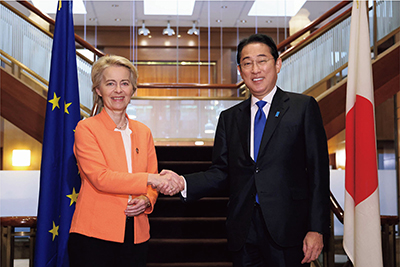 Meeting between Prime Minister Kishida and President of the European Commission von der Leyen (September 23, New York, U.S.; Photo: Official Website of the Prime Minister of Japan and His Cabinet)
Meeting between Prime Minister Kishida and President of the European Commission von der Leyen (September 23, New York, U.S.; Photo: Official Website of the Prime Minister of Japan and His Cabinet)In November, Foreign Minister Iwaya held the first Japan-EU Foreign Ministerial Strategic Dialogue with High Representative of the European Union for Foreign Affairs and Security Policy Josep Borrell Fontelles, who was visiting Japan. During the dialogue, Foreign Minister Iwaya exchanged instruments related to ratification of the Japan-EU SPA, and the agreement formally entered into force on January 1, 2025. Furthermore, the Japan-EU Security and Defence Partnership was announced. Japan became the first country in the Indo-Pacific with which the EU publicly announced such a partnership. In light of the recent increasingly severe security environment, Japan and the EU concurred on strengthening concrete cooperation and dialogue in areas such as cyber issues, space, responses to hybrid threats, and maritime security. In addition, in February, State Minister for Foreign Affairs TSUGE Yoshifumi attended the Third EU Indo-Pacific Ministerial Forum held in Brussels, Belgium. He welcomed the increasing interest and engagement of European countries and the EU in the Indo-Pacific and stated Japan's intention to cooperate toward maintaining and strengthening the free and open international order based on the rule of law.
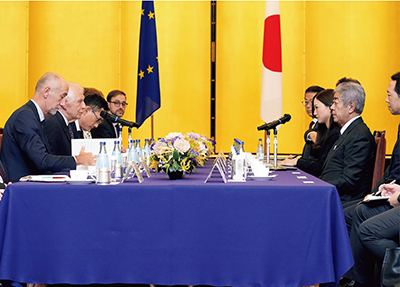 1st Japan-EU Foreign Ministerial Strategic Dialogue (November 1, Tokyo)
1st Japan-EU Foreign Ministerial Strategic Dialogue (November 1, Tokyo)The EU, with its economic scale that follows the United States (U.S.) and China, is an important economic partner of Japan, ranking third among Japan's import partners, third among export partners, and second in terms of the balance of direct investment in Japan. The Japan-EU EPA, which entered into force in 2019, created a massive economic zone accounting for approximately 20% of the global GDP, under which the ties between Japan and the EU have further strengthened. In addition, on July 1, the Protocol Amending the Agreement Between the European Union and Japan for an Economic Partnership entered into force, including provisions on the free flow of data. This amendment is expected to ensure predictability regarding cross-border data flows, promote data exchange between Japan and the EU, and ultimately contribute to strengthening Japan-EU economic relations. With regard to the Japan-EU EPA, in July, the fifth meeting of the Joint Committee established under the Japan-EU EPA was held between Foreign Minister Kamikawa and Executive Vice President of the European Commission for an Economy that Works for People, and European Commissioner for Trade, Valdis Dombrovskis. Both sides confirmed progress in various fields, discussed responses to the EU's introduction of advanced regulations, and ensured steady implementation and operation of the EPA through the various specialized committees and working groups. Separately from the EPA, as part of efforts to promote broader strategic cooperation with the EU, Foreign Minister Kamikawa, Minister of Economy, Trade and Industry SAITO Ken, and Executive Vice President Dombrovskis held the fifth Japan-EU High-Level Economic Dialogue in May. They confirmed cooperation in the economic security field, the launch of the “Transparent, Resilient and Sustainable Supply Chain Initiative,” and strengthening of the free trade system with the World Trade Organization (WTO) at its core among others. Going forward, Japan will continue to ensure the steady implementation of the Japan-EU EPA and promote cooperation with the EU, including the Japan-EU High-Level Economic Dialogue, with the aim of further developing Japan-EU economic relations.
(2) United Kingdom
In April, the Safety of Rwanda bill submitted by the Sunak administration was enacted, enabling the transfer of asylum seekers to Rwanda. However, the European Court of Human Rights and the Supreme Court of the UK ruled this illegal, and the transfers were never carried out. In May, Prime Minister Rishi Sunak dissolved the House of Commons, and a general election for the House of Commons was held in July. The Labour Party, led by Keir Starmer won an outright majority, bringing about a change in government for the first time in 14 years. The Labour Party had pledged five missions (kickstart economic growth, make Britain a clean energy superpower, restore public safety, break down barriers to opportunity, and build a national health service fit for the future). Following the electoral defeat, Prime Minister Sunak resigned. That same month, the new administration abolished the plan to transfer asylum seekers to Rwanda. However, immigration remained a major domestic issue in the UK, and from late July to early August, riots broke out in various locations, triggered by an incident involving the injury and death of children.
There was an active dialogue between the governments of Japan and the UK at various levels, including the summit and foreign minister levels. In February, Prime Minister Kishida received a courtesy call by the Japanese and British co-chairs and British members of the Japan-UK 21st Century Group. Prime Minister Kishida also held an informal talk with Prime Minister Sunak during the G7 Apulia Summit in June. Prime Minister Kishida held a telephone call in July with Prime Minister Starmer, followed by a meeting during the NATO Summit held that same month. In November, Prime Minister Ishiba held a meeting with Prime Minister Starmer during the G20 Rio Summit, during which the leaders announced the launch of the Japan-UK Economic 2+2 Ministers' Meeting (“Economic 2+2”).
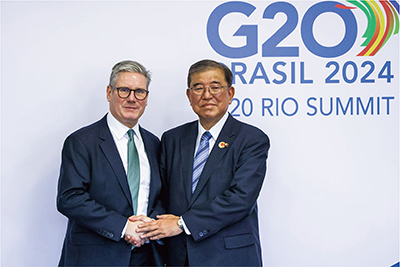 Japan-UK Summit Meeting (November 18, Rio de Janeiro, Brazil; Photo: Official Website of the Prime Minister of Japan and His Cabinet)
Japan-UK Summit Meeting (November 18, Rio de Janeiro, Brazil; Photo: Official Website of the Prime Minister of Japan and His Cabinet)At the foreign minister level, Foreign Minister Kamikawa held meetings with Secretary of State for Foreign, Commonwealth and Development Affairs David Cameron during the G20 Foreign Ministers' Meeting in February and the G7 Foreign Ministers' Meeting in April. Foreign Minister Kamikawa also held a telephone call with Secretary of State for Foreign, Commonwealth and Development Affairs David Lammy in July as well as a meeting during the ASEAN-related Foreign Ministers' Meetings later that month. Foreign Minister Iwaya also held a telephone call with Secretary Lammy in October, and they met again in person during the G7 Foreign Ministers' Meeting in November.
On the cultural front, effective April 1, the number of UK nationals eligible to participate in Japan's Working Holiday Program (visa issuance quota) was increased from 1,000 to 6,000 per year. (Note: The number of Japanese nationals eligible to use the UK Youth Mobility Scheme (visa issuance quota) was increased from 1,500 to 6,000 per year effective January 31, 2024.) In addition, effective December 1, the maximum stay period for UK nationals participating in Japan's Working Holiday Program was extended from one year to two years. These developments are expected to further promote youth exchanges and mutual understanding between Japan and the UK.
(3) France
In January, Prime Minister Elisabeth Borne resigned, and Gabriel Attal was inaugurated as the new Prime Minister, becoming the youngest in the history of the Fifth Republic.
In May, deliberations were held in the National Assembly on a constitutional amendment regarding voting rights in local elections in New Caledonia, a French overseas territory. Pro-independence groups turned violent, and a state of emergency was declared across New Caledonia. President Macron then visited New Caledonia, and after holding discussions with both pro-independence and anti-independence groups, President Macron expressed his intention to pursue a “comprehensive agreement” through the restoration of public order, economic recovery, and political dialogue.
In June, President Macron dissolved the National Assembly, with the first round of voting held on June 30 and the second round on July 7. As a result, the left-wing coalition made significant gains and became the party with the most seats, while the ruling coalition suffered major losses and became the party with the second-largest number of seats. In response, Prime Minister Attal announced his resignation. Subsequent coordination over the nomination of a new prime minister led to President Macron appointing Michel Barnier, a former chief negotiator on Brexit and member of the right-wing Republicans Party rather than a candidate from the left-wing coalition, as the new Prime Minister on September 5. The new Barnier cabinet was then formed.
In addition, the Paris 2024 Summer Olympic and Paralympic Games were held from July to September.
With respect to foreign affairs, France worked to continue and strengthen its support for Ukraine in response to Russia's aggression against Ukraine. In February, a France-Ukraine summit meeting was held, and the two countries signed a bilateral security agreement to ensure Ukraine's long-term security. In addition, during the same month, President Macron held an international conference on support for Ukraine, taking a leading role in international support for Ukraine. With regard to the situation in the Middle East, France has called for an immediate and sustained ceasefire in Gaza as well as the immediate release of the hostages and has been actively engaged in efforts toward resolving the situation. Since taking office, Minister for Europe and Foreign Affairs Jean-Noël Barrot has made multiple visits to the Middle East. In October, under President Macron's initiative, France held an international conference on support for Lebanon, during which it announced 100 million euro in aid and the provision of 100 tons of humanitarian supplies to the country.
With regard to Japan-France relations, in February, Foreign Minister Kamikawa visited Rio de Janeiro to attend the G20 Foreign Ministers' Meeting and held a foreign ministers' meeting with Minister for Europe and Foreign Affairs Stéphane Séjourné. During the meeting, Foreign Minister Kamikawa expressed her hope to further advance Japan-France relations by following up on the Roadmap on Japan-France Cooperation under the “Exceptional Partnership” announced at the Japan-France Summit Meeting in December 2023. In February 2024, based on the Roadmap, the first Japan-France Economic Security Working Group was held in Paris, where the two sides exchanged views on key issues concerning economic security such as the protection of critical and emerging technologies, strengthening the resilience of supply chains, responding to non-market measures and practices, and countering economic coercion. In May, Prime Minister Kishida visited Paris to attend the OECD Ministerial Council Meeting and held a Japan-France Summit Meeting with President Macron. In the meeting, the two leaders welcomed the multilayered developments of Japan-France cooperation in the Indo-Pacific and announced the launch of negotiations on the Japan-France Reciprocal Access Agreement (RAA). Prime Minister Kishida also held an exchange of views with Prime Minister Attal during the visit. In the same month, Foreign Minister Kamikawa, who accompanied Prime Minister Kishida to France, held a Japan-France Foreign Ministers' Meeting with Minister for Europe and Foreign Affairs Séjourné. The two Ministers concurred to further deepen the historic friendly relations between Japan and France as “Exceptional Partners” across the fields of security, the economy, and culture.
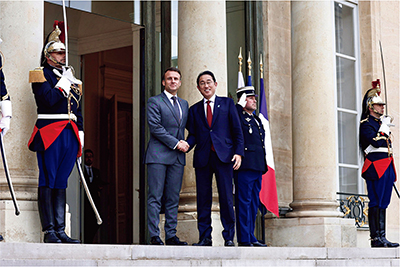 Japan-France Summit Meeting (May 2, Paris, France; Photo: Official Website of the Prime Minister of Japan and His Cabinet)
Japan-France Summit Meeting (May 2, Paris, France; Photo: Official Website of the Prime Minister of Japan and His Cabinet)In October, Foreign Minister Iwaya held a telephone call with Minister for Europe and Foreign Affairs Barrot. In November, Foreign Minister Iwaya visited Italy to attend the G7 Foreign Ministers' Meeting and held his first in-person Japan-France Foreign Ministers' Meeting with Minister for Europe and Foreign Affairs Barrot.
In December, Prime Minister Barnier invoked Article 49.3 of the French Constitution during the deliberations on the Social Security Financing Bill, part of the 2025 budget proposal. In response, the opposition submitted a no-confidence motion, which was passed. This resulted in the collapse of the Barnier cabinet. On December 13, President Macron appointed François Bayrou, leader of the Democratic Movement, as the new Prime Minister.
(4) Germany
The administration of Federal Chancellor Olaf Scholz (Social Democratic Party (SPD)) faced internal policy conflicts within the coalition, including over fiscal policy, and the Free Democratic Party (FDP) withdrew from the government in November. As a result, the so-called “traffic light coalition” composed of the SPD, the Green Party, and the FDP collapsed, and the government was forced to operate as a two-party minority administration composed of the SPD and the Green Party for the time being. Seeking cooperation from the largest opposition party, the Christian Democratic Union of Germany and Christian Social Union in Bavaria (CDU/CSU, conservative), with the goal of passing legislation and the budget bill by the end of the Bundestag parliamentary session in December, Chancellor Scholz expressed his intention to dissolve the Bundestag after the passage of the 2025 budget bill and other related legislation, and to move up the next federal election, which was originally scheduled for September 2025. Subsequently, after consultations between the ruling and opposition parties, it was agreed that the early election would be held on February 23, 2025. The movements of each party ahead of the early federal election are drawing attention amid rising support for the right-wing populist party Alternative for Germany (AfD), which advocates for strict immigration policies, and expanded its influence in the June European Parliament election as well as in the September state elections in two states that were formerly part of East Germany.
Regarding diplomatic policy, Germany continued to work intensively to respond to the situation in Ukraine, including holding the Ukraine Recovery Conference (URC) in June. With regard to the Israel-Palestine situation, Chancellor Scholz and Federal Minister for Foreign Affairs Annalena Baerbock visited Israel to express solidarity with the country, while also calling for improvements in the humanitarian situation in the Gaza and taking steps to ease tensions. In the area of security, as part of efforts to implement the Policy Guidelines for the Indo-Pacific formulated by the Government of Germany in 2020, Germany strengthened its engagement in the region under the Indo-Pacific Deployment 2024, including port calls in Tokyo in August by the frigate Baden-Württemberg and the replenishment ship Frankfurt am Main.
With regard to Japan-Germany relations, Germany is an important partner that shares common values and principles, and high-level exchanges continue to take place actively. In July, Prime Minister Kishida visited Berlin and held a Japan-Germany Summit Meeting, during which both sides welcomed the progress in bilateral security cooperation in recent years, particularly as Germany strengthens its engagement in the Indo-Pacific region. In the same month, the Japan-Germany Acquisition and Cross-Servicing Agreement (ACSA) entered into force, establishing a framework for settlement procedures for the reciprocal provision of supplies and services between the Japan Self-Defense Forces (SDF) and the Armed Forces of the Federal Republic of Germany. The ACSA is expected to promote closer cooperation between the SDF and the German Armed Forces , and enable Japan and Germany to actively contribute to peace and security of the international community. In addition, bilateral cooperation in the increasingly important field of economic security has advanced in recent years. In November, the first meeting of the Japan-Germany Economic Security Consultations took place in Berlin. Moreover, 2024 marked the 50th anniversary of the Agreement between Japan and Germany on Cooperation in the field of Science and Technology, and a commemorative Jubilee was held in Kyoto in October.
(5) Italy
The administration of Prime Minister Giorgia Meloni has maintained a cooperative policy with Europe and the U.S. on the diplomatic and economic fronts. In the European Parliament elections held in June, the right-wing party Brothers of Italy (European Conservatives and Reformists), led by Prime Minister Meloni, secured 28.8% of the vote, strongly defending its position as the leading party in Italy. In terms of domestic affairs, illegal immigration countermeasures and responses to the declining birthrate and aging population remain ongoing issues. While working to curb unauthorized immigration, the Government of Italy also responded to domestic labor shortages by expanding the quota for legal entries from outside the EU to 452,000 in July 2023. (Note: The quota was 83,000 in 2022.)
As for Japan-Italy relations, as Italy succeeded Japan as the G7 Presidency, dialogue and mutual visits between the two countries became even more active at various levels, including at the summit and foreign minister levels. During Prime Minister Meloni's visit to Japan in February, the two sides confirmed cooperation in the field of security, as seen in the Global Combat Air Programme (GCAP), joint naval exercises, and port calls by naval vessels, including those of aircraft carrier strike group (CSG). At the G7 Apulia Summit in June, Prime Minister Kishida and Prime Minister Meloni held an informal talk and announced the launch of the Japan-Italy Action Plan as well as the start of negotiations on the Acquisition and Cross-Servicing Agreement (ACSA).
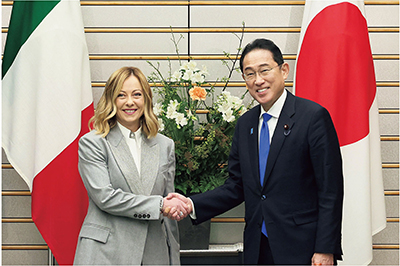 Japan-Italy Summit Meeting (February 5, Tokyo; Photo: Official Website of the Prime Minister of Japan and His Cabinet)
Japan-Italy Summit Meeting (February 5, Tokyo; Photo: Official Website of the Prime Minister of Japan and His Cabinet)Foreign Minister Kamikawa and Antonio Tajani, Vice-President of the Council of Ministers and Minister of Foreign Affairs and International Cooperation, held telephone calls in January, April, and June, confirming that the two countries would closely cooperate under Italy's G7 Presidency. August saw the entry into force of the Japan-Italy Film Co-production Agreement, which had been signed the previous year by then Foreign Minister Hayashi and Minister of Culture Gennaro Sangiuliano.
In the field of security, from August 2 to 5, the Japan Maritime Self-Defense Force (JMSDF) Training Squadron Kashima and Shimakaze made a port call in Naples and conducted a Japan-Italy goodwill exercise with the Italian Navy frigate Margottini in the Aegean Sea. From August 6 to 8, Italian Air Force fighter jets visited Japan and participated in the Japan-U.S.-Italy joint exercise “Rising Sun 24” at Misawa Air Base. In late August, an Italian CSG made a port call in Japan, consisting of the light aircraft carrier Cavour, the frigate Alpino, and the patrol vessel Montecuccoli, which participated in the joint exercise “Noble Raven 24-3” with Japan, Australia, Italy, Germany, and France in the area from south of the Kanto region to east of Okinawa. During the same period, the Italian Navy training ship Amerigo Vespucci made its first-ever port call in Tokyo, and Minister of Defence Guido Crosetto visited Japan in conjunction with the ship's port call.
In November, Foreign Minister Iwaya visited Fiuggi, Italy, to attend the G7 Foreign Ministers' Meeting. While in Rome, he met with Minister of Defense Crosetto, and the two Ministers signed the Japan-Italy ACSA.
(6) Spain
In November 2023, Prime Minister Pedro Sánchez was reappointed as Prime Minister following a successful vote of confidence in the lower house of parliament with the support of left-wing parties, including regionalist parties from Catalonia and the Basque Country. (This marked the launch of the third Sánchez administration.) Spain's domestic economy recorded a growth rate exceeding that of the EU (Spain had a 2.5% growth rate in 2023 compared to the EU average of 0.4%.), supported by the recovery of the tourism sector and a decline in electricity prices. However, Spain continues to face challenges such as a high unemployment rate and fiscal stabilization, even within the EU framework.
With regard to Japan-Spain relations, the two countries are strengthening their cooperation under the strategic partnership, which was upgraded upon concurrence at the summit in 2018. In February, State Minister for Foreign Affairs Tsuge, who was attending the Third EU Indo-Pacific Ministerial Forum in Belgium, held a meeting with Diego Martínez Belío, State Secretary for Foreign and Global Affairs for the Ministry of Foreign Affairs, European Union and Cooperation. Both sides welcomed the progress of bilateral cooperation in fields such as security, defense, and the economy, and confirmed they would further promote such cooperation. In July, Minister of Economy, Trade and Enterprise Carlos Cuerpo visited Japan and exchanged views on bilateral business opportunities.
In addition, there was progress in cooperation both in the public and private sectors, including the 24th Japan-Spain Symposium held in Takamatsu City, Kagawa Prefecture in October. In the economic field, progress was also seen in bilateral cooperation in the renewable energy sector, such as in offshore wind power generation.
Bilateral defense cooperation also steadily progressed. In July, Eurofighter aircraft from the Spanish Air Force visited Japan, and in August, the JMSDF Training Squadron made its first-ever port call in Valencia.
(7) Poland
Poland, as Ukraine's neighbor, has actively responded since the start of Russia's aggression against Ukraine, playing a major role as a hub of support to Ukraine. Poland has been accepting many Ukrainian evacuees, and Japan has been providing support to Poland in light of the increasing burden and vulnerability it faces. In addition, in December, in order to contribute to the stabilization of living conditions and the securing of educational opportunities for Ukrainian children continuing to live as evacuees in Poland, Japan decided to provide language therapy equipment to the Wrocław Psychological and Educational Center through Grant Assistance for Grassroots Human Security Projects.
With regard to Japan-Poland relations, there were frequent high-level mutual visits. In January, Foreign Minister Kamikawa visited Poland, where she paid a courtesy call on President Andrzej Duda, held a meeting with Minister of Foreign Affairs Radosław Sikorski, and exchanged views with Minister of Education Barbara Nowacka. Foreign Minister Kamikawa also visited the Polish-Japanese Academy of Information Technology, an institution that Japan supported in its establishment. Foreign Minister Kamikawa exchanged views with Polish and Ukrainian students studying at the university, as well as with Ukrainian evacuees residing in Poland. In addition, Foreign Minister Kamikawa and Minister of Foreign Affairs Sikorski held a telephone call in July. After the inauguration of the Ishiba administration, Foreign Minister Iwaya held a telephone call with Minister of Foreign Affairs Sikorski in November.
In addition, in July, Minister of Education, Culture, Sports, Science and Technology MORIYAMA Masahito visited Poland and held a meeting with Minister of Education Nowacka. In August, Minister of Justice KOIZUMI Ryuji visited Poland and held meetings with Minister of Justice Adam Bodnar and Minister of the Interior and Administration Tomasz Siemoniak. In the same month, Secretary of State of the Ministry of Foreign Affairs Władysław Teofil Bartoszewski visited Japan and held a meeting with Parliamentary Vice-Minister for Foreign Affairs FUKAZAWA Yoichi.
(8) Ukraine
Based on the strong recognition that Russia's aggression against Ukraine, which began in February 2022 is an outrageous act that shakes the very foundations of the international order, Japan has consistently and strongly promoted support for Ukraine and sanctions against Russia since the beginning of the aggression. In 2024 as well, Japan had advanced efforts toward realizing a just and lasting peace in Ukraine, through high-level visits to Ukraine by Japanese dignitaries and cooperation with other countries in various international fora, such as the G7.
On January 7, Foreign Minister Kamikawa visited Ukraine and paid courtesy calls on President Zelenskyy and Prime Minister Denys Shmyhal, and also held a meeting with Minister for Foreign Affairs Dmytro Kuleba. Foreign Minister Kamikawa conveyed Japan's intention to continue its strong support for Ukraine and exchanged views on directions for cooperation toward recovery and reconstruction. Foreign Minister Kamikawa visited a support facility for women and children established by the United Nations Children's Fund (UNICEF), exchanged views with representatives of international organizations stationed in Ukraine among others, and stated that Japan would continue its support so that the people of Ukraine can regain a sense of safety and security in their lives.
On February 19, the Japan-Ukraine Conference for Promotion of Economic Growth and Reconstruction was held in Tokyo with the participation of Prime Minister Shmyhal in order to provide strong, unified public-private sector support for Ukraine's recovery and reconstruction by leveraging knowledge derived from Japan's postwar and disaster reconstruction efforts, as well as advanced technology and knowhow from the private sector. During the conference, Prime Minister Kishida stated that support for Ukraine is an “investment for the future” of Ukraine, Japan, and the world, and noted that Ukraine's recovery and revitalization facing Russian aggression is in the interest of the entire international community.
Moreover, during the Japan-Ukraine Summit telephone call held on April 3, Prime Minister Kishida stated that the Japan-Ukraine Conference for Promotion of Economic Growth and Reconstruction had been held successfully and expressed his hope to steadily implement the deliverables of the conference.
On February 25, marking two years since the start of Russia's aggression against Ukraine, the G7 Leaders' Video Conference was convened under Italy's G7 Presidency, with Prime Minister Kishida in attendance. President Zelenskyy participated at the beginning of the conference, and following the conference, a G7 Leaders' Statement was issued expressing the G7's unwavering support for Ukraine.
On April 18, Foreign Minister Kamikawa held a Japan-Ukraine Foreign Ministers' Meeting with Foreign Minister Kuleba on the occasion of the G7 Foreign Ministers' Meeting. Foreign Minister Kamikawa emphasized that Japan would continue to demonstrate, at every opportunity, that Japan's unity in support for Ukraine is unwavering.
At the G7 Apulia Summit held from June 13 to 15, the situation in Ukraine was among the topics discussed. Prime Minister Kishida, noting the importance of the G7 continuing to stand united in support of Ukraine, stated that Japan would strongly promote support for Ukraine, especially in reconstruction with a medium- to long-term perspective. During the Summit, Prime Minister Kishida also held a meeting with President Zelenskyy and signed the Accord on Support for Ukraine and Cooperation between the Government of Japan and Ukraine, a bilateral document based on the Joint Declaration of Support for Ukraine issued during the NATO Summit in July 2023. This was the first such bilateral document signed by a non-Atlantic country, underscoring that the issue of Ukraine is not merely a European matter, but one that concerns the entire international community.
On June 15, Prime Minister Kishida attended the Summit on Peace in Ukraine held by the Government of Switzerland. He welcomed that this summit took place following the discussions held at the G7 Hiroshima Summit in May of the previous year. He emphasized that peace in Ukraine should be a “just and lasting peace” based on international law, including the United Nations (UN) Charter, and should not be the one that justifies unilateral attempts to change the status quo by force or coercion as well as achieving a “just and lasting peace” in Ukraine is symbolically important in leading the entire international community toward a world of cooperation, not that of division and confrontation.
On June 11 and 12, Parliamentary Vice-Minister for Foreign Affairs Fukazawa attended the Ukraine Recovery Conference, which was co-hosted by the Government of Germany and the Government of Ukraine. He mentioned the steady progress in follow-up efforts stemming from the outcomes of the Japan-Ukraine Conference for Promotion of Economic Growth and Reconstruction held in February, and expressed Japan's continued commitment to support Ukraine through unified public-private sector effort .
On July 11, during his attendance at the NATO Summit held in Washington, D.C., U.S., Prime Minister Kishida participated in the Japan-Australia-New Zealand-ROK (IP4) + Ukraine Leaders' Meeting, with the participation of President Zelenskyy. Prime Minister Kishida stated that this meeting was meaningful in that it demonstrated that Ukraine is an issue not only for Europe but also for the entire international community, including the Indo-Pacific. The leaders of the countries concurred on continued cooperation between the IP4 countries and Ukraine. On the same day, Prime Minister Kishida also attended the ceremony for issuing the Ukraine Compact and expressed unwavering commitment to continuing strong support for Ukraine based on the bilateral documents signed between each country and Ukraine.
On September 23, during the UN General Assembly, Prime Minister Kishida held a summit meeting with President Zelenskyy. Prime Minister Kishida stated that two and a half years ago, when Russia's aggression began, he decided to firmly stand up against the outrage that shook the foundation of the international order with a strong sense of crisis that “Ukraine today may be East Asia tomorrow,” and that Japan would continue to do its utmost to support Ukraine. On the same day, Foreign Minister Kamikawa, who was also attending the UN General Assembly, held a meeting with Foreign Minister Andrii Sybiha.
On October 25, the G7 Leaders' Statement on Extraordinary Revenue Acceleration (ERA) Loans was issued. Under the ERA framework and as part of the approximately 50 billion U.S. dollars concurred upon by the G7, Japan announced that it would provide 471.9 billion Japanese yen, equivalent to approximately 3.3 billion U.S. dollars,(4) in yen loans.
On November 16, Foreign Minister Iwaya visited Ukraine and conveyed to the Ukrainian side that under the newly formed Ishiba administration as well, Japan will never waver in its position of standing with Ukraine. Foreign Minister Iwaya also discussed the dispatch of soldiers from North Korea to Russia and concurred on strengthening cooperation during his courtesy call on President Zelenskyy and meeting with Foreign Minister Sybiha. Regarding the “Victory Plan” explained by President Zelenskyy, Foreign Minister Iwaya conveyed Japan's support for the earliest possible realization of a just and lasting peace in Ukraine, as stated in the “Victory Plan.” In his courtesy call on Prime Minister Denys Shmyhal, Foreign Minister Iwaya signed the Agreement on the Security of Information between Japan and Ukraine, which will serve as the institutional basis for information sharing between the two governments. Furthermore, during his visit, Foreign Minister Iwaya held exchanges of views with First Deputy Prime Minister and Minister of Economy Yuliia Svyrydenko and other officials related to mine action, and attended the ceremony for Japan's provision of power-related equipment to Ukraine, expressing that Japan would continue to strongly promote support for Ukraine.
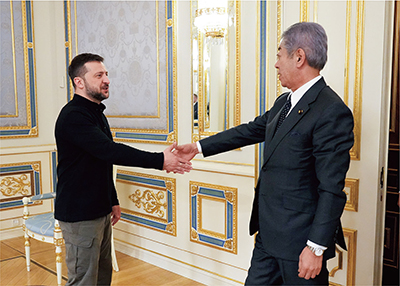 Courtesy call by Foreign Minister Iwaya on President Zelenskyy of Ukraine (November 16, Kyiv, Ukraine)
Courtesy call by Foreign Minister Iwaya on President Zelenskyy of Ukraine (November 16, Kyiv, Ukraine) Japan-Ukraine Foreign Ministers' Meeting (November 16, Kyiv, Ukraine)
Japan-Ukraine Foreign Ministers' Meeting (November 16, Kyiv, Ukraine)On November 16, just before the 1,000th day since the start of Russia's aggression against Ukraine, the G7 leaders issued the G7 Leaders' Statement on Enduring support for Ukraine, expressing their determination to stand in solidarity in support of Ukraine's fight for sovereignty, freedom, independence, territorial integrity, and reconstruction.
On December 16, First Deputy Prime Minister and Minister of Economy Svyrydenko, who visited Japan to attend the Ninth Japan-Ukraine Economic Joint Meeting, held meetings with Chief Cabinet Secretary Hayashi and Foreign Minister Iwaya. Foreign Minister Iwaya conveyed his expectations that Japanese companies' participation in the recovery and reconstruction of Ukraine would make further progress through the Economic Joint Meeting, and that Japan would continue to support Ukraine.
On December 25, Prime Minister Ishiba held his first summit telephone call with President Zelenskyy. The two leaders exchanged views on the situation surrounding Ukraine, including the involvement of North Korean soldiers in combat. Prime Minister Ishiba expressed his intention to continue to cooperate with Ukraine to realize a just and lasting peace in Ukraine as soon as possible. The two leaders concurred that they would continue to work closely together.
- (4) The dollar-denominated equivalent amounts of each contribution are calculated based on the exchange rate released by the EU as of September 19.
■A Transforming EU
The European Union (EU) is currently undergoing a transformation from a mere economic union to a global security provider. One of the pillars of the foundation of the EU is the Common Foreign and Security Policy (CFSP), which emphasizes the strengthening of international security and the promotion of universal values. In addition, the EU has developed the Common Security and Defence Policy (CSDP). Under the CSDP, recognizing that instability of the international environment outside the EU can lead to increased threats within the bloc, the EU has deployed numerous military and civilian missions beyond its borders as initiatives to promote international peace and security.
Furthermore, Russia's aggression against Ukraine has forced the EU to change even more as it confronts the reality of war once again in Europe. At the same time, new expectations are being placed on the EU's role. Given the investment gap in the defense industry following the end of the Cold War in Europe, the EU has formulated the European Defence Industrial Strategy (EDIS) and begun efforts to strengthen its defence industrial base. In July, European Commission President Ursula von der Leyen, who was reappointed for a second term, called on EU member states to seize the opportunity to build a true defense union. The European Commission has also taken a new direction, including establishing a Commissioner responsible for Defence and Space, a position equivalent to that of a minister.
■The Japan-EU Security and Defence Partnership
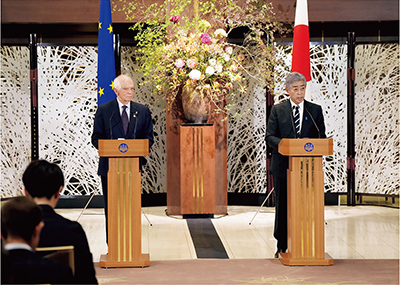 Foreign Minister Iwaya and High Representative of the European Union for Foreign Affairs and Security Policy, Vice-President of the European Commission Josep Borrell Fontelles announcing the Japan-EU Security and Defence Partnership (November 1, Iikura Guest House, Ministry of Foreign Affairs, Tokyo)
Foreign Minister Iwaya and High Representative of the European Union for Foreign Affairs and Security Policy, Vice-President of the European Commission Josep Borrell Fontelles announcing the Japan-EU Security and Defence Partnership (November 1, Iikura Guest House, Ministry of Foreign Affairs, Tokyo)Against the above backdrop, the relationship between the EU and Japan, which continues to transform over time, is also moving toward a new stage. In 2024, amid growing recognition that the security of Europe and the Indo-Pacific is inseparable, the Japan-EU Security and Defence Partnership was announced. Utilizing the existing framework of cooperation, the partnership aims to further develop areas of cooperation and dialogue related to security and defense.
The areas of cooperation set out in this partnership are wide-ranging. They encompass not only traditional fields such as military and civilian missions, maritime security, disarmament and non-proliferation, and countering terrorism and violent extremism, but also non-traditional fields such as cyber, hybrid threats including Foreign Information Manipulation and Interference (FIMI), and the defense industry, which is a priority for Europe. As the areas of cooperation expand, the challenges of the increasingly wide-ranging EU organizations involved have become more apparent. In addition to the European External Action Service (EEAS), which serves as the EU's foreign ministry, there is also the involvement of the European Council, alongside the European Commission and the EU member states. Moreover, in many cases, authority and financial resources for concrete cooperation are solely in the hands of the EU member states.
■The diversity and complexity of the EU
The diversity of these areas of cooperation and the complexity of EU organizations present difficulties when considering or negotiating Japan-EU cooperation. However, they are also strengths unique to the EU, which has a deeply rooted multilayered bureaucracy based on the rule of law, the economic scale of its 27 EU member states, and a powerful single internal market. The Mission of Japan to the European Union, based in Brussels, Belgium - home to the EU headquarters - has established a Security and Defense Unit. The political and defense officials there work together to strengthen Japan-EU cooperation at the forefront. In addition, in the context of cyber, hybrid threats, and the defense industry, further inter-ministerial cooperation is also necessary. Going forward, Japan will continue to advance Japan-EU security and defense cooperation initiatives through a concerted national effort that spans multiple ministries, based in Brussels which is considered the heart of Europe.
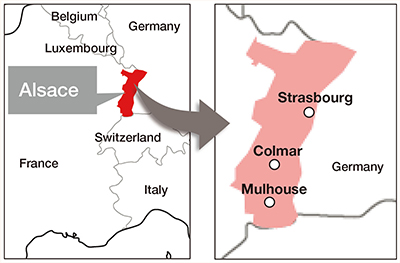
From 2023 to 2024, Japan and Alsace in France celebrated the 160th anniversary of their exchanges. Alsace, which has a history of hardship as it swayed between French and German control, has now become a symbol of the reconciliation between France and Germany as well as European integration. This column introduces the long-standing exchanges between Alsace and Japan.
■The Initial Encounter and the Legacy of Exchanges
The first encounter between Japan and Alsace dates back to the end of the Tokugawa Shogunate. In 1863, merchants from Osaka visited Mulhouse, a city with a developed textile industry, and commissioned the production of woolen fabrics featuring traditional Japanese patterns. The following year, the textiles from Mulhouse arrived in Japan, marking the beginning of exchanges. This coincided with the period of the rise of Japonisme in France, when Japanese ukiyo-e prints and distinct designs captured the French imagination.
 Ginkgo trees in a square in Strasbourg
Ginkgo trees in a square in StrasbourgIn the 1880s, Japanese exchange students began coming to the University of Strasbourg, which was then part of Germany, for scientific studies. Around 1900, it is also said that Emperor Meiji gifted ginkgo trees to German Kaiser Wilhelm II, and these trees still stand beautifully in a square in the city of Strasbourg today.
The next major leap in Japan-Alsace exchanges came in the 1980s. At the time, local people in Alsace actively sought to attract Japanese companies spreading over Europe, resulting in a major Japanese electronics manufacturer expanding into the region in 1986. This sparked a wave of Japanese companies setting up operations in the Colmar area. As a result, the number of Japanese companies and residents in the region increased, leading to the opening of the Japanese school “Lycée Seijo d'Alsace” in 1986 and the establishment of the Consulate General of Japan in Strasbourg in 1992. André Klein, who led these efforts, placed importance on not just attracting Japanese companies but also deepening economic and cultural exchanges in a dual approach. His strong conviction ultimately led to the founding of the Centre Européen d'Etudes Japonaises d'Alsace (CEEJA) in 2001. CEEJA continues to play a key role in fostering Japan-Alsace exchanges today.
In the academic sphere, the Department of Japanese Studies was established at the University of Strasbourg in 1986. In 2001, the Maison Universitaire France-Japon and the Strasbourg Office of the Japan Society for the Promotion of Science (JSPS) were successively established. Today, the University of Strasbourg has agreements with around 30 Japanese universities, and inter-university exchanges are thriving.
■Journey Toward the Future
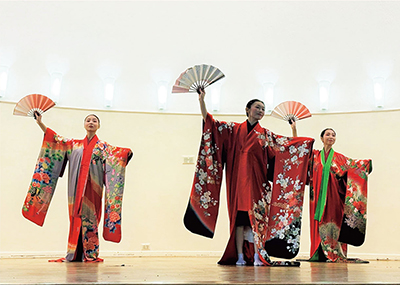 A performance held during the “JapanWeek” (November, Colmar, France)
A performance held during the “JapanWeek” (November, Colmar, France)As a concluding event for the 160th anniversary, the “JapanWeek” was held in November 2024 in Colmar to showcase Japanese culture. Over the course of a week, many people from both France and Japan enjoyed cultural exchanges through Japanese culture.
Looking ahead, Alsace wine will be served at the France Pavilion of the 2025 World Exposition (Expo 2025 Osaka, Kansai, Japan) and the opening of the “Musée Européen du Manga et de l'Anime” is planned for Colmar in 2027. Exchanges between Japan and Alsace are expected to further deepen in a wide range of fields, including the economy, culture, and academia. In every era, such exchanges are supported by the efforts and dedication of the people involved. The Ministry of Foreign Affairs will continue to support the development of these exchanges.


